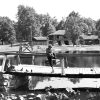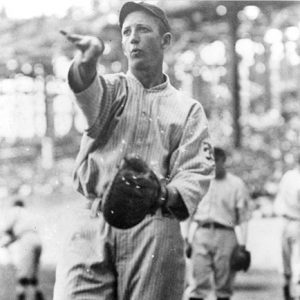calsfoundation@cals.org
Gene Paulette (1891–1966)
Gene Paulette was a professional baseball player whose career totaled six seasons in the major leagues. He played with four clubs: the American League’s St. Louis Browns and the National League’s St. Louis Cardinals, New York Giants, and Philadelphia Phillies. An athlete of average speed and hitting ability, Paulette excelled as a defensive infielder. His time in the major leagues was cut short when, amid game-fixing accusations, he became the first player ever to be banned from baseball. After his career ended, Paulette returned to Arkansas, where he lived the rest of his life.
Gene Paulette was born on May 26, 1891, in Centralia, Illinois, to Joseph Paulette and Marguerite DeServe Paulette. Paulette was the eleventh of twelve children born to the couple, who were of French Canadian descent. Paulette’s father worked for the railroad, a job that brought the family to Arkansas. Paulette lived most of his life in Little Rock (Pulaski County). He went to a Catholic high school in Little Rock and attended college, though he did not graduate.
Paulette, who batted and threw right handed, was six feet tall but weighed only 150 pounds when he was drafted by a scout for the New York Giants. Paulette was initially acquired for his catching skills, but he played his first game at third base. Paulette saw limited action in his rookie season, playing in only ten games and batting .167 (two hits in twelve at bats). The Giants played (and lost to) the Philadelphia Athletics in the World Series that year, but Paulette did not play in the post season.
As did many players of his time, Paulette worked in the off season to make extra money. After his rookie year, he played in the Cuban American Major League Clubs Series. Before he left the United States for Cuba, he married Mary Elizabeth Mahoney of North Little Rock (Pulaski County). The couple had a daughter, Mary Elizabeth Paulette, and a son, Eugene Paulette Jr.
Paulette spent the next four seasons in the minor leagues, playing for the Mobile Sea Gulls, Nashville Volunteers, Cleveland Bearcats, and Memphis Chickasaws. In 1916, he returned to the major leagues with the St. Louis Browns. Paulette played only five games with the Browns before being sent to the minors again, this time with the Memphis Chickasaws. By 1917, however, Paulette was back in the major leagues. From 1917 to 1920, Paulette played for three teams: the St. Louis Browns, St. Louis Cardinals, and the Philadelphia Phillies. Paulette’s best season was his last. In 1920, the first full year of the “live-ball era,” Paulette played in 143 games and batted .288 with 33 walks and 59 runs scored, all career highs. He also hit what was for him a rare homerun.
Paulette played in a total of 500 games at the major league level, most with the Cardinals as a first baseman. Paulette’s career coincided with the end of the “dead-ball era,” a time in which the rules and equipment of the game caused low-scoring games and a lack of home runs. Paulette hit only two. He finished his modest career with 478 hits, a .269 career batting average, and 43 stolen bases.
In 1921, his career was cut short by scandal. While playing with the Cardinals, Paulette associated with St. Louis gamblers Elmer Farrar and Carl Zork. Paulette agreed to take money in exchange for affecting the outcome of certain games. Paulette’s ties to gamblers were known before his final season, but it was not until September 1920 that the scandal broke.
That month, a jury in Chicago, Illinois, met in order to investigate a “fixed” game between the Cubs and Phillies (then Paulette’s team) had played on August 31. Paulette found himself part of a larger scandal involving major league players fixing games. In 1919, the “Black Sox,” eight Chicago White Sox players, were ultimately banned from baseball for conspiring to throw the World Series. Paulette, though not connected to the Black Sox scandal, had the notoriety of being the first player ever banned from baseball. In March 1921, baseball commissioner Kenesaw Mountain Landis questioned Paulette’s claims of innocence. To back up his allegations, Landis had an incriminating letter Paulette had written to Elmer Farrar. Landis was convinced Paulette had betrayed his team in exchange for money.
Paulette never faced criminal charges for his conduct, but, determined to maintain baseball’s integrity in the wake of the Black Sox scandal, Landis banned Paulette from professional baseball. On March 24, 1921, Paulette was banned not just from the major leagues but the minor leagues as well. Landis set the precedent of major league baseball taking a hard line toward players who gamble, such as “Shoeless” Joe Jackson and Pete Rose, who have been kept out of the Baseball Hall of Fame due to their gambling affiliations.
Paulette, who denied any wrongdoing, refused to abide by Landis’s decision. A few days after his ban, he managed to get a spot playing infield for a team in Massillon, Ohio, that was not affiliated with the major leagues. Word spread, however, that Paulette was again playing baseball. A Philadelphia, Pennsylvania, sportswriter called for a boycott of Paulette’s team, and eventually other clubs followed suit. Paulette quit soon after.
His career over by the age of thirty, Paulette returned to Little Rock, where he worked for the railroads and as an auditor for the Internal Revenue Service. He died of a heart attack on February 8, 1966. Funeral services were held at Our Lady of Holy Souls in Little Rock, and he is buried at Calvary Cemetery.
For additional information:
“Gene Paulette.” BaseballReference.com. https://www.baseball-reference.com/register/player.fcgi?id=paulet002eug (accessed November 9, 2017).
Lamb, Bill. “Gene Paulette.” Society for American Baseball Research. https://sabr.org/bioproj/person/147b2f14 (accessed November 9, 2017).
McKenna, Brian. Early Exits: The Premature Endings of Baseball Careers. Lanham, MD.: Scarecrow Press, 2007.
Colin Woodward
Stratford Hall
 Early Twentieth Century, 1901 through 1940
Early Twentieth Century, 1901 through 1940 Recreation and Sports
Recreation and Sports Gene Paulette
Gene Paulette 



Comments
No comments on this entry yet.